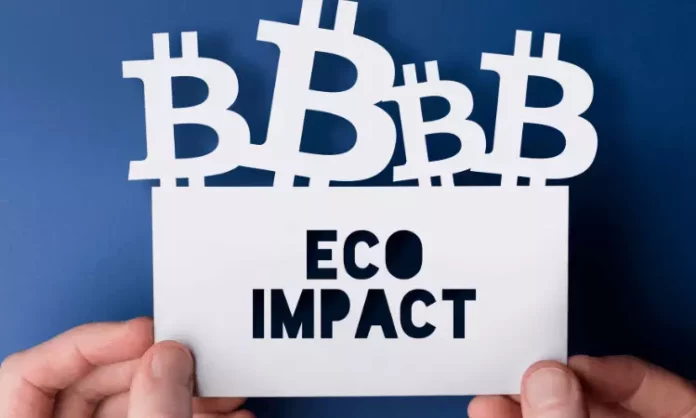In the era of heightened environmental awareness, the debate over whether cryptocurrency is eco-friendly has become a topic of considerable significance.
Cryptocurrencies like Bitcoin, Ethereum, and others have surged in popularity, but they have also faced mounting scrutiny due to their energy-intensive mining processes.
As concerns about climate change intensify, it’s crucial to delve into the environmental impact of cryptocurrencies.
This article explores the various dimensions of this debate, examining the ecological implications of crypto mining, the efforts to make cryptocurrencies more sustainable, and the potential role of digital currencies in a green future.
Is Cryptocurrency Eco-Friendly?
The eco-friendliness of cryptocurrency remains a complex and debated issue.
Traditional cryptocurrencies like Bitcoin, which rely on energy-intensive proof-of-work mining, have drawn criticism for their substantial carbon footprint.
The vast computational power required for mining operations consumes significant electricity, often sourced from non-renewable sources.
However, the emergence of eco-friendly alternatives, such as proof-of-stake-based cryptocurrencies, presents a more sustainable path.
These newer cryptocurrencies consume far less energy, as they don’t rely on competitive mining.
Still, the overall impact depends on factors like the energy mix used for mining and the broader adoption of greener practices.
While some cryptocurrencies pose environmental concerns due to their energy consumption, the ongoing shift towards eco-friendly options signals a potential for the industry to become more sustainable.
Understanding Cryptocurrency Mining.
Cryptocurrency mining, a fundamental process in the realm of digital currencies, serves a dual purpose of validating transactions and minting new coins.
The process operates on two primary consensus mechanisms: proof-of-work (PoW) and proof-of-stake (PoS).
PoW, utilized by pioneering cryptocurrencies like Bitcoin, involves miners solving intricate mathematical puzzles to verify transactions.
The catch?
This process is energy-intensive and can lead to substantial carbon emissions.
In contrast, PoS is a more environmentally friendly alternative.
Here, validators, often referred to as stakeholders, are chosen to create new blocks and confirm transactions based on the number of coins they hold and are willing to “stake” as collateral.
The energy consumption associated with PoS is significantly lower than that of PoW, presenting a potential solution to the environmental concerns surrounding cryptocurrency.
Environmental Concerns Of Cryptocurrency Mining.
As cryptocurrencies gained traction, concerns about their carbon footprint escalated.
The energy consumption of PoW-based cryptocurrencies, particularly Bitcoin, has raised eyebrows due to the colossal computational power required for mining operations.
Mining farms, equipped with high-performance hardware, gobble up electricity at an alarming rate, leading to comparisons between cryptocurrency energy consumption and that of entire countries.
Critics point out that the energy consumption estimates vary widely, leading to uncertainty about the true extent of cryptocurrencies’ environmental impact.
Determining the energy mix used for mining, which can range from coal to renewables, further complicates the issue.
Despite these discrepancies, it’s undeniable that the energy-intensive nature of PoW mining raises legitimate environmental concerns.
Renewable Energy Adoption In Mining Operations.
Amid the rising alarm over the environmental toll of cryptocurrency mining, efforts have emerged to pivot towards more sustainable practices.
Some mining companies are switching to renewable energy options like solar, wind, and hydroelectric power.
These sources, with their lower carbon emissions, offer a glimmer of hope for reducing the environmental impact of mining.
However, the road to fully sustainable cryptocurrency mining is not without obstacles.
Relocating mining operations to regions abundant in renewable energy resources isn’t always feasible due to infrastructural limitations and economic considerations.
Moreover, the intermittent nature of renewable sources like solar and wind can pose challenges to maintaining the uninterrupted operation of mining farms.
While renewable energy adoption is a step in the right direction, it’s crucial to address these challenges to ensure a more eco-friendly future for cryptocurrencies.
Emergence Of Eco-Friendly Cryptocurrencies.
Recognizing the environmental concerns associated with PoW mining, a new wave of cryptocurrencies has emerged with eco-friendliness at their core.
These cryptocurrencies employ the PoS consensus mechanism, which inherently consumes significantly less energy.
By eliminating the resource-intensive competition of PoW, these eco-friendly cryptocurrencies demonstrate a commitment to mitigating the environmental impact.
The PoS model not only reduces energy consumption but also addresses other drawbacks of PoW, such as the centralization of mining power and the dreaded 51% attack vulnerability.
This shift towards eco-friendly alternatives is indicative of the cryptocurrency community’s awareness of the need for sustainability.
However, these newer cryptocurrencies are still in the early stages of adoption and face challenges in gaining the same level of recognition as their PoW predecessors.
Blockchain Technology Beyond Mining.
While the spotlight often focuses on the energy-intensive mining process, blockchain technology holds potential beyond this single application.
One promising avenue is supply chain transparency.
Blockchain’s immutable ledger can trace products’ origins and journeys, promoting accountability and reducing environmental harm caused by illegal or unethical practices.
Similarly, blockchain enables the creation of platforms for trading renewable energy directly, fostering a decentralized energy market.
Moreover, blockchain’s role in tracking carbon offsets could revolutionize carbon trading and incentivize companies to reduce their emissions.
By tokenizing carbon credits on a blockchain, transparency and trust are bolstered, potentially accelerating efforts to combat climate change.
These applications highlight the versatility of blockchain technology in promoting sustainability beyond its energy-intensive origins.
Regulatory Measures And Industry Initiatives.
In response to the growing concerns over cryptocurrency’s environmental impact, regulatory bodies and governments have taken steps to address the issue.
Some countries have imposed restrictions on mining operations, citing their strain on power grids and contribution to emissions.
These regulations, while aiming to curb the environmental toll, also pose challenges in terms of their enforceability and potential displacement of mining activities to regions with laxer regulations.
Concurrently, the cryptocurrency industry itself is witnessing the rise of initiatives that champion sustainable practices.
Some mining operations are exploring carbon-neutral mining, while others are investing in carbon offset projects to counterbalance their emissions.
These industry-led efforts, combined with regulatory actions, underscore the increasing recognition of the need for sustainability in the cryptocurrency space.
Balancing Innovation And Sustainability.
The quest for eco-friendliness in the cryptocurrency industry highlights a fundamental tension between technological innovation and environmental responsibility.
Critics argue that the energy consumption of cryptocurrencies is intrinsic to their security and functionality.
Drastically reducing energy usage might compromise these essential attributes.
Striking the right balance is paramount – a balance that enables innovation without sacrificing environmental well-being.
Collaboration among stakeholders is crucial in this pursuit.
Developers, miners, investors, regulators, and the broader public must engage in meaningful dialogue to shape the future of cryptocurrencies in a way that aligns with sustainable practices.
The crypto community has a unique opportunity to lead by example, demonstrating that innovative technologies can coexist harmoniously with environmental stewardship.
Investor And Consumer Influence.
Beyond industry and regulatory efforts, the choices made by investors and consumers can wield significant influence.
The demand for environmentally conscious investments and products is on the rise, urging companies and projects to adopt greener practices.
Investors are increasingly scrutinizing the carbon footprint of their portfolios, while consumers are favoring eco-friendly products and services.
This trend extends to the cryptocurrency realm, where conscious investors are showing a preference for coins and projects that prioritize sustainability.
This shift in demand could incentivize crypto projects to adopt PoS mechanisms and implement energy-efficient practices to attract investors who prioritize environmental responsibility.
Conclusion.
The eco-friendliness of cryptocurrency is a complex and evolving issue.
While the energy consumption associated with crypto mining is undeniably substantial, ongoing technological advancements, coupled with a growing awareness of environmental concerns, are driving the cryptocurrency industry toward greater sustainability.
As the world continues to grapple with climate change, cryptocurrencies have the potential to play a transformative role in the financial landscape, provided that the industry collectively strives for greener solutions.
Ultimately, the journey toward eco-friendly cryptocurrencies is a dynamic one, and it remains to be seen how effectively this digital revolution can harmonize with environmental responsibility.







